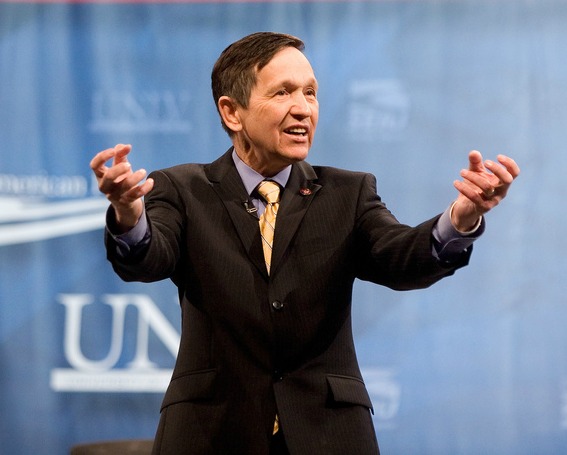
Update: Dennis Kucinich dropped out of the presidential race on Jan. 25, 2008.
Democratic presidential candidate Dennis Kucinich has been active and outspoken on a wide range of environmental and sustainability issues during the decade he’s represented Ohio’s 10th district in the U.S. House. His efforts have earned him a 92 percent lifetime rating from the League of Conservation Voters.
Read an interview with Dennis Kucinich by Grist and Outside.
- Proposes a Works Green Administration (modeled on Franklin Roosevelt’s Works Progress Administration) that would put millions of Americans to work building and installing clean-energy technologies, retrofitting homes for energy efficiency, etc.
- Calls for extensive government funding to develop renewable-energy technologies, and for withdrawal of government subsidies for nonrenewable energy.
- Calls for a “Global Green Deal” that would push development of renewable energy in the U.S., creating jobs in the process, and partner with developing nations to provide them with affordable, clean energy technologies.
- Calls for a phaseout of all nuclear power plants, and for more stringent regulation of nuclear waste.
- Calls for a phaseout of all coal power and coal mining. Has highlighted the threat of mercury pollution from coal-fired power plants.
- Cosponsor of Rep. Henry Waxman’s Safe Climate Act, the toughest climate bill in the House, which calls for reducing carbon emissions 80 percent from 1990 levels by 2050.
- Calls for a ban on logging, mining, and other resource extraction on U.S. public lands.
- Has been a vegan since 1995.
Watch Kucinich explain his positions on climate change and energy issues at a Nov. 17, 2007, Grist-sponsored forum:
Watch Kucinich explain his climate and environment strategy:
[vodpod id=Video.16092218&w=425&h=350&fv=%26rel%3D0%26border%3D0%26]
Watch Kucinich answer the snowman’s climate question at the CNN/YouTube debate on July 23, 2007:
[vodpod id=Video.16092222&w=425&h=350&fv=%26rel%3D0%26border%3D0%26]
Watch Kucinich explain his proposed Works Green Administration:
[vodpod id=Video.16092236&w=425&h=350&fv=%26rel%3D0%26border%3D0%26]
Listen to a clip of Kucinich’s interview with Grist and Outside:
Quotable Quotes
- “We have to understand the connection between global warring and global warming, because when we start talking about wars for oil, we’re essentially keeping the same approach to energy. So I’m saying we need to move away from reliance on oil and coal and toward reliance on wind and solar, and that’s the basis of my WGA, a Works Green Administration, where we take an entirely new approach to organize the entire country around sustainability, around conservation.”
— July 23, 2007, in a CNN/YouTube debate between Democratic candidates
Platform & Record In-Depth
- Opposes drilling in the Arctic National Wildlife Refuge and has supported legislation to turn it into a wilderness area.
- Cosponsor of a bill that would require the U.S. to get 20 percent of its electricity supply from renewable sources by 2020. Has also called for a target of 20 percent renewable-generated electricity by 2010.
- Supports a bill that would raise fuel-economy standards for automobiles to 35 miles per gallon by 2018, including for autos up to 10,000 pounds.
- Calls for support of organic family farmers.
- Cosponsor of bills that would assist and promote farmers’ markets.
- Calls for repealing NAFTA and dissolving the WTO, in part because he says they have allowed and encouraged environmental degradation.
- Opposes privatization of water systems.
- Has repeatedly accused oil companies of price gouging. In 2005, introduced the Gas Price Spike Act, which would impose a “windfall profits” tax on oil companies and use the revenue to fund transit and fuel-efficient cars.
- Calls for electronics manufacturers to take back their products after their useful lives and figure out ways to responsibly reuse or recycle them, as a way to deal with the problem of electronic waste.
- Has called for caution [DOC] in the spraying of pesticides to combat West Nile Virus, asking the government in 2004 to consider the long-term environmental and human-health effects.
- Wants to regulate emissions from factory farms as industrial pollution subject to permits, limits, and fines for non-compliance.
- Expresses serious concerns about genetically engineered food, and has introduced legislation that would regulate it and require it to be labeled.
- Cosponsor of a bill that would fund study of widespread honeybee disappearances, aka colony collapse disorder.
- Calls for legalization of hemp farming.
- Consistently supports a wide range of animal welfare bills in Congress.
- In 2002, voted against storing nuclear waste at the Yucca Mountain repository now being built in southern Nevada.
Still Haven’t Gotten Enough?
- Read Grist’s 2003 interview with Dennis Kucinich, conducted during his previous bid for the Democratic presidential nomination.
- Read Kucinich’s environmental platform on his campaign website.
- Read Kucinich’s official bio.
What did we miss? Tell us below in comments. We’ll update this page as the presidential campaign continues.
Todd Hymas Samkara and Kate Sheppard contributed to this fact sheet.


